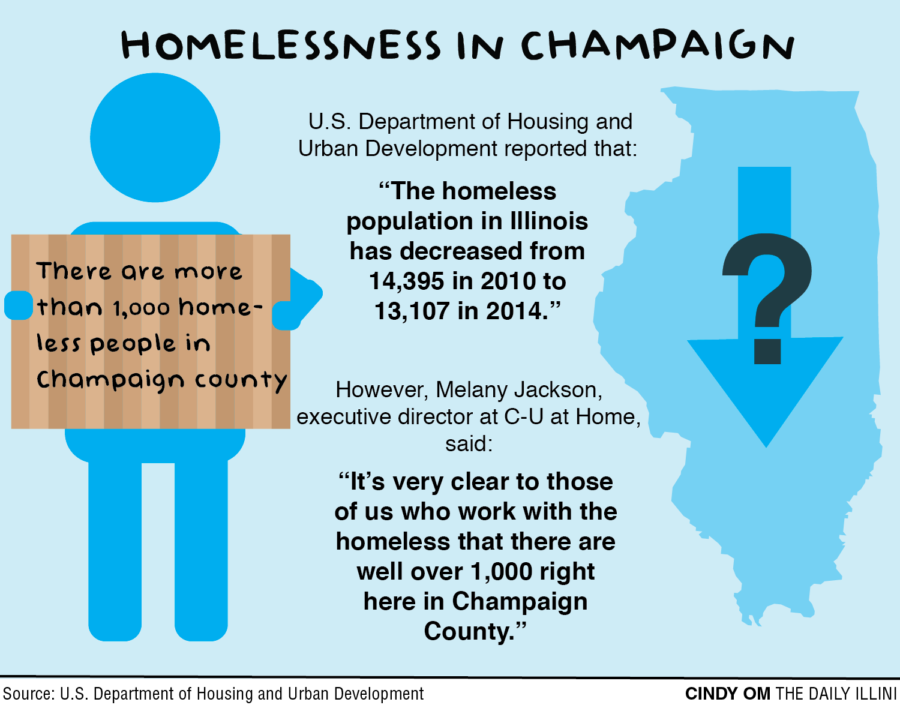Homelessness in the place we call home
Feb 25, 2016
In between Mia Za’s and the next building over is a stoop — a stoop that serves as a person’s entire home. There is a person that sleeps, eats and sits there day in and day out.
Further down the road, typically on the corner of Sixth Street and Green Street, a man tries to make a living playing the keyboard. He sings songs by U2 and Elton John with a box in front of him for spare change.
Most students at the University know the homeless characters who inhabit Green Street. Many students walk a little quicker when they spot them and some avoid eye contact by looking down at their phones, but very few take the time to acknowledge their presence.
It’s understandable why some people lack awareness of Champaign-Urbana’s homeless population, as so many of us come from the impenetrable bubble that is the suburbs of Chicago. Living amongst perfectly trimmed lawns and white picket fences, many University students never saw people sleeping outside in their neighborhoods.
Travel to downtown Chicago, or in my case, attend school there for a year, and this bubble is quickly popped. In my time attending DePaul University, I had both positive and negative interactions with homeless people that I’d never experienced in my suburban hometown.
Get The Daily Illini in your inbox!
Homelessness is not contained to big, bustling downtown areas, like many often assume. But Homelessness is also more than just a man sitting on a street corner with a cardboard sign asking for money. Homelessness is a widespread reality for many in the Champaign-Urbana community, and plagues the area in different, and often tougher, ways.
It’s often hard to remember there is a world beyond the campus boundaries of Green Street and Lincoln Avenue. However, both homelessness and poverty rates run extremely high in the community we love to call home, and this often goes unnoticed by students.
Contrary to the misinformed and often degrading stereotypes, homeless people very rarely truly abuse the welfare system. Many of them are simply trying to overcome issues that limit their ability to maintain jobs or stable living conditions.
“Many mentally ill homeless people are turned over to the police,” said MaryCate Most, a student and Daily Illini employee who volunteers at a daytime drop-in center for the homeless run by C-U at Home. “The combination of a police record and mental illness makes finding a job nearly impossible. It’s a vicious cycle of mental illness, unemployment, homelessness and addiction.”
There are a recorded 400 to 500 homeless people in Champaign, although Melany Jackson, executive director of C-U at Home, says it’s more plausibly over 1,000. Additionally, poverty rates in the city of Champaign remain high, as 26.6 percent of Champaign’s population fell below the poverty line between 2009 and 2013. https://www.dailyillini.com/article/2014/11/government-reports-decline-in-illinois-homeless-population-doesnt-reflect-champaign-county http://quickfacts.census.gov/qfd/states/17/1712385.html
Homeless people may struggle with mental illness, addiction and a wide array of personal issues; however, they are still human beings, and human beings who deserve the same kind of respect that we give our friends, family, acquaintances and professors.
Students would be wise to remember that offering money isn’t the only way to help the homeless. The least we can do is acknowledge them — give them a smile, say “Hello” and then carry on with our days. Ask if they would like the leftovers you’re carrying out of Noodles, or even ask if they need a pair of gloves as you’re walking into Walgreens.
For further involvement, different places around campus allow students to participate in volunteer work. Check out the Canteen Run, C-U at Home, our Daily Bread soup kitchen and other volunteer programs that work with our homeless community if you feel like making a larger contribution.
When tragic events are on the news every day, it’s difficult not to become complacent about the struggles of others. But we cannot be complacent about the issues that plague members of our Champaign-Urbana community.
These individuals may be homeless, but they are human beings first.
Cassandra is a sophomore in LAS.






